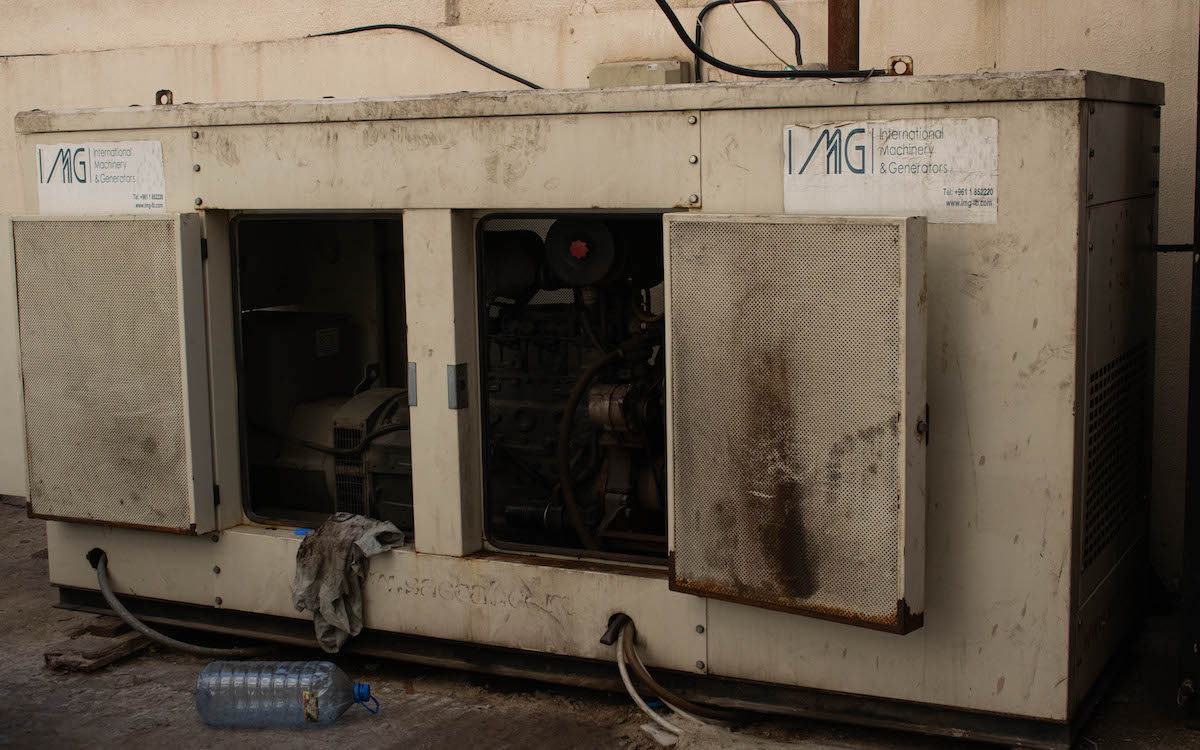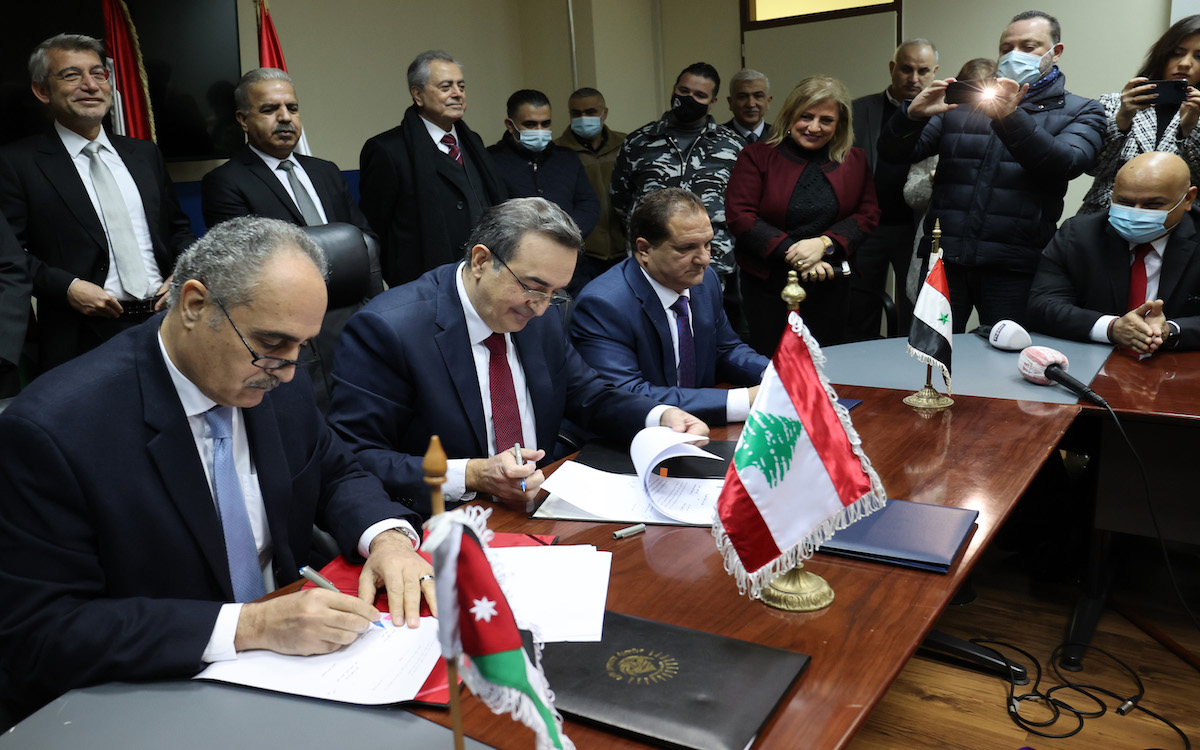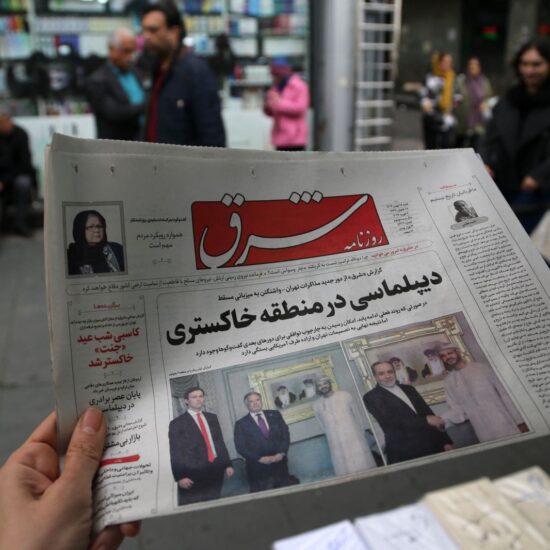
The clock struck midnight and the lights throughout Lebanon began to cut. By 1 AM, there were no lights except for the small battery-powered ones in several homes that gave off a dim, blue hue.
As Lebanon’s economic crisis continues to worsen since its start in late 2019, the price of diesel has steadily increased due to the Lebanese government’s inability to import fuel to power the state electricity company, Électricité du Liban (EDL).
By mid-2022, the government only provided up to four hours of electricity per day in the major cities, with the smaller, more rural villages receiving even less. This has forced homes and businesses to rely heavily on private generators in order to receive just enough power to keep the lights on and the refrigerator running. In most cases, the owners of these generators provide just over 12 hours of electricity – if the subscriber is able to afford it.
While the private generators used to accept payments in Lebanese Lira, an increasing number of generator operators now only take dollars as the value of the lira continues to fluctuate and the price of fuel continues to rise.
Now, with a hot and humid summer looming, electricity output from both EDL and the private generators are likely to fail to meet the demand for electricity use.
“The price of diesel is increasing, so tariffs will increase and if they are going to operate for the same number of hours, the monthly bill will be higher,” Marc Ayoub, an energy researcher at the American University of Beirut, told NOW. “So you’ll have three to four hours in the best case scenario from EDL. Currently, the generators were producing, in the winter, 12 to 14 hours. [In summer] you will get 10 to 12 hours maximum. And you’ll have at least 10 hours of blackout.”
The collapse of Lebanon’s energy sector
Prior to the start of the economic crisis, the issues currently plaguing Lebanon’s energy sector were already apparent.
EDL only provided around 21 hours of electricity per day, with some areas only receiving around half of that, and the rest having to be made up through the use of generators.
According to a 2019 IMF report, 84 percent of businesses used these private generators in order to fill the gap left by the state. Today, nearly all use generators at some point during the day. On top of that, the cost to use these private generators is, on average, three times higher than the rest of the region, with prices continuing to rise as the economic crisis worsens.
The country’s power plants are also out of date, some dating back to the 1950s, and have not received adequate updates and repairs.
EDL also received around a quarter of the government’s annual budget, partly due to mismanagement of the sector and a lack of reforms.
Once the economic crisis started to worsen, so did the energy sector’s capabilities.
The government began having a harder time paying for the fuel required to keep EDL running at full capacity, and diesel started to become increasingly expensive, eventually becoming scarce and difficult to procure during 2021’s fuel crisis, leading to generator owners rationing fuel and reducing the number of hours of electricity that they provided.
Another condition [for the deals] was the reforms that Lebanon had to take in the electricity sector and we haven’t seen much of those reforms. These are the two pending issues. If they don’t solve them, then we will not see the gas coming in.
With the fuel crisis continuing throughout the summer, it was especially brutal for Lebanon’s population, many of whom were forced to sleep on their rooftops or balconies to keep from overheating.
There were also frequent extended blackouts, as the government power plants struggled to keep up with usage.
There was an initial proposal in January 2022 to provide EDL with an advance payment of 5.25 trillion lira (around $3.5 billion at the official exchange rate) in order to secure fuel.
However, this proposal saw strong opposition from groups like the Amal Movement, headed by Speaker of Parliament Nabih Berri, and the advance was tabled until the energy sector could be reformed, something that is yet to occur.
The armed Shiite party Hezbollah also saw an opportunity to step in as the great saviors of Lebanon by using its connection to Iran, which supports the group both financially and militarily, to import fuel from its ally.
Despite not receiving approval from the Lebanese state, Hezbollah brought the fuel in through Syria, but it was not enough to even make a dent in the crisis.
In the lead-up to the May 15 parliamentary elections, there were reports that some of the old establishment parties were offering fuel or to pay for people’s generator bills in order to secure their votes.
Ultimately, the Lebanese government made a deal with Iraq to send the ailing Mediterranean country fuel in exchange for goods and services. But it remains unclear what this would entail, or if Lebanon has held up its end of the deal.
Now, with little having changed since last summer, Ayoub says that people will likely face the same situation in the summer of 2022.
“Currently, the main problem is that we are relying on one source of heavy fuel oil for the powerplants which is the Iraqi fuel,” the researcher said. “The quantities that are being sent from Iraq on a monthly basis is around 40,000 tons of fuel after being swept. These quantities cannot allow more than 450 to 500 megawatts of [electricity] production across the country.”
According to Ayoub, Lebanon’s power plants, when working at full capacity, are able to produce between 1,500 to 1,800 megawatts.
However, this agreement is set to end by September and, if it is not renewed or Lebanon is unable to find another source of fuel, it would quickly plunge the country into total darkness.

Help from abroad
When Lebanon’s fuel crisis began, the country was desperate to find a source that could provide it with either fuel or electricity.
When Hezbollah announced that it was bringing fuel over from Iran, the United States was quick to arrange other options for Lebanon in an attempt to counter Hezbollah and, by extension, Iran.
This resulted in an agreement between Lebanon and Jordan, where the Hashemite Kingdom would send Lebanon 250 megawatts of electricity through Syria. Syria, which is also suffering from its own electricity problems, agreed to the deal as long as it received some of the electricity as payment.
It also required the US to approve the agreement so that Jordan would not be sanctioned under the Caesar Act.
Once Jordan sent the electricity to Lebanon, it would add two additional hours of electricity that was being provided by the government.
Another deal, this time with Egypt, was also struck in which Egypt would send some of its excess natural gas to Lebanon through Syria, reportedly enough to produce 450 megawatts, or around four hours of electricity. Syria again agreed on the condition that it was able to utilize some of the gas. The deal would also require US approval to avoid sanctions.
However, eight months since the deals were first announced, no gas has arrived from Egypt, nor any electricity from Jordan.
“From the beginning, it was clear that there were many hurdles. And one of them is the political hurdle and Egypt really wanting to have a guarantee that it would not be affected by the Caesar Act sanctions,” Laury Haytayan, an oil and gas policy expert, told NOW.
“Another condition [for the deals] was the reforms that Lebanon had to take in the electricity sector and we haven’t seen much of those reforms. These are the two pending issues. If they don’t solve them, then we will not see the gas coming in.”
To make matters worse, with the Russian invasion of Ukraine, the European Union is working to rid itself of its dependency on Russian gas and is working to make a deal with Egypt and Israel that would see Israeli fuel turned into liquified natural gas in Egypt and then sent to Europe.
The diesel is available but it is in dollars. And if the generator owners want to produce similar to what they have been doing in the winter, they will charge more and the price will be higher for the subscribers. Therefore, I expect them to be turning on [the generators] less than before.
For Egypt, this could be a more lucrative option as it would put the country in better standing with the West, and would prove less troublesome than waiting around for Lebanon to pass reforms and receive US approval.
“Egypt would want to be seen by the Europeans as a stable supplier and a supplier that they can trust because, for them, it is a big deal that they become part of the group of countries that supply Europe with the gas once they start depending less and less on the Russian gas,” Haytayan said.
“It’s more important strategically for Egypt to send the extra gas to Europe instead of dealing with this headache of not having guarantees from the Americans, not being sure that they will get paid [through the World Bank loan] or even that Syria would stop that gas from flowing for political reasons or security reasons.”
Given that the pipelines would run from Syria to Lebanon through the southern part of the country which is unstable due to ISIS infiltration and rebel activity, a pipeline transporting fuel could pose a major target.
There is also the issue of funding the projects.
Originally, the World Bank was going to give Lebanon a loan of around $600 million to finance the projects, but the money only ever came in for the Egypt deal and the remainder of the funding would not be raised until sometime in 2023.
“Maybe if they feel that the Egyptian project is not going forward, maybe the Jordanian gas is moving forward, if there are reforms so that they allocate the money for the Jordanian deal [the World Bank would allow for the funds to be used for the Jordanian deal],” Haytayan stated. “But all of that is not significant because, at the end of the day, the Jordanian project is for two hours of electricity per day which is nothing.”
With these two other projects stalled, Lebanon has become heavily dependent on Iraq to provide fuel so that EDL can provide the few hours of electricity that it currently does.
Since the agreement will expire in a few months, it is now up to Najib Mikati’s caretaker government to secure an extension or to renew the deal, something that both Ayoub and Haytayan believe will indeed happen.
“Because the situation has been bad and because the Iraqis have been really supportive of Lebanon and if you look at that, now, Iraq is making a lot of money because of the high oil prices,” Haytayan said. “So they might consider selling or giving Lebanon fuel and the quantities that they want is not a big deal so they can afford it.”
However, Ayoub added that while Iraq could continue providing the current quantities of fuel, it has to meet its own local needs as well, which means it can only offer fuel in the small amounts it is currently providing.
Iran also cut its gas supply to Iraq due to nonpayment since Iraq’s caretaker government is not authorized to make such payments, which account for a third of Iraq’s needed energy supply in the summer, which could also further complicate matters.
Even if Lebanon is able to renew the agreement with Iraq, it would only perpetuate the current situation and, with fuel prices rising, it will make it harder on people to be able to afford to pay for private generator subscriptions to make up for the 20 hours or more that are not being provided by the government.
“Sadly, it is going to be a very tough summer,” Ayoub stated. “The diesel is available but it is in dollars. And if the generator owners want to produce similar to what they have been doing in the winter, they will charge more and the price will be higher for the subscribers. Therefore, I expect them to be turning on [the generators] less than before.”
Nicholas Frakes is a multimedia journalist with @NOW_leb. He tweets @nicfrakesjourno.








